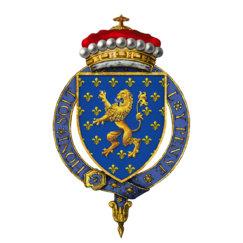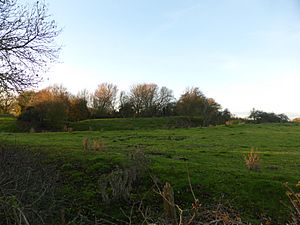John Beaumont, 1st Viscount Beaumont facts for kids
Quick facts for kids
John Beaumont
|
|
|---|---|
| Viscount Beaumont | |

Arms of Sir John Beaumont, 1st Viscount Beaumont, KG
|
|
| Other titles | 6th Baron Beaumont |
| Born | c. 1409 Folkingham Castle, Lincolnshire |
| Died | 10 July 1460 Northampton, Northamptonshire |
| Offices | Steward of the Duchy of Lancaster Lord Great Chamberlain Lord High Constable |
| Noble family | House of Beaumont |
| Spouse(s) | Elizabeth Phelip Katherine Strangways |
| Issue | William Beaumont, 2nd Viscount Beaumont |
| Father | Henry, 5th Baron Beaumont |
| Mother | Elizabeth Willoughby of Eresby |
John Beaumont, 1st Viscount Beaumont (born around 1409 – died 10 July 1460) was an important English nobleman. He came from Folkingham, Lincolnshire. John Beaumont was a trusted adviser to King Henry VI.
He received many rewards for his loyalty. He became a leading member of the East Anglian nobility. Beaumont held many important jobs for the king. He was even the first person to be given the special title of viscount. He also became very rich through family money, marriage, and gifts from the king.
John Beaumont was involved in many big events during Henry VI's time. He helped protect the king during Jack Cade's Rebellion in 1450. He also helped stop a rebellion led by Richard, Duke of York in 1452. While York and his friends fought against the king, Beaumont stayed loyal to the Lancastrian side. This was during the 1450s, when the Wars of the Roses began. His strong loyalty to King Henry VI eventually cost him his life. He died protecting the king at the Battle of Northampton in 1460. John Beaumont's son, William Beaumont, continued to fight against the Yorkists.
Contents
Early Life and Family
John Beaumont was born at Folkingham Castle. He was the oldest son of Henry Beaumont, 5th Baron Beaumont. John became an orphan when he was only four years old. King Henry V took him under his care. The king quickly placed John with Henry Beaufort, who was the Bishop of Winchester.
In 1425, John's right to marry was given to Sir John Radcliffe. This was to help pay off debts the king owed him. John was first called to Parliament as Lord Beaumont in 1431. Between 1425 and 1436, he married Elizabeth Phelip. She was the daughter of Sir William Phelip. Sir William was a famous knight.
When Sir William Phelip died in 1441, his large East Anglian lands went to his daughter. This meant John Beaumont gained control of these lands. This made him a very important person in that area. He also had his own family lands in Leicestershire. Because of his wealth and power, he became friends with William de la Pole, Earl of Suffolk. Through this friendship, he joined the household of King Henry VI.
In 1429, John Beaumont was made a knight by the seven-year-old King Henry VI. This happened just before the king's coronation. John then went to France with Henry the next year. Some historians believe that John might have grown up with the king. This could explain why he was treated so well later on.
Serving the King
John Beaumont's first big job for the king was in France. He went with the king's uncle, the Duke of Gloucester, in 1436. Their goal was to help Calais. This was a quick but large military campaign. It was the biggest English army seen in France since Henry V's time.
He briefly helped the Duke of York in Normandy. But they all returned to England by July 1437. For his service, he was given the county of Boulogne as a reward. However, he never went back there. In 1438, he became a "prominent Household servant." He was made steward of the Duchy of Lancaster and steward of Leicester, Castle Donington, and Higham Ferrers.
In 1439, he joined the king's council. This council was basically running the country while the king was still a child. In 1446, he was deeply involved in peace talks with the French. In 1445, he was made Lord High Constable. He was also sent to France that year for peace talks. Five years later, he was sent to talk with the Scots.
In 1457, John Beaumont was personally involved in a case about Bishop Pecock. The bishop was very against a group called the Lollards. But his strong views made people suspect him of heresy (beliefs against church teachings). Beaumont started a formal investigation into the bishop's writings. Bishop Pecock agreed to take back his statements and gave up his bishop job a year later.
Royal Favor and Rewards
By 1440, John Beaumont was a clear favorite of the king. He was made the first ever English viscount as Viscount Beaumont in 1440. This might have been because he had lost Boulogne. He was then given royal lands in East Anglia. He also received more official jobs in royal castles. He was made Lord Great Chamberlain and a Knight of the Garter. He was also given the feudal Viscountcy of Beaumont in France.
In 1445, he was made the "premier viscount." This meant he would rank higher than any other viscounts created after him. Historians have wondered why he received "such an extraordinary heap of honors and perquisites." One idea is that he was a major noble in East Anglia. This important position made him worthy of such high promotions.
Beaumont ordered a special hand-written book about chivalry. It was called Knyghthode and Bataile. This book was given to the king. He also gave a lot of money to Queens' College, Cambridge. The king had given this college to his wife, Queen Margaret, in 1448.
Second Marriage
John Beaumont's first wife, Elizabeth Phelip, died by October 1441. Within two years, he married Katherine Neville. She was the widow of the Duke of Norfolk. Katherine Neville was important in her own right. She was the sister of Richard Neville, Earl of Salisbury. She was also the sister of Cecily Neville, Duchess of York.
This marriage was considered a great prize. It brought John Beaumont even more land and money.
Political Life
John Beaumont was deeply involved in the political problems during Henry VI's reign. He was part of a small group of men who worked for the king. They helped the king in his council and during his travels. However, his attendance at the council became less regular by 1443.
As Steward of England, he personally arrested Humphrey, Duke of Gloucester. This happened for treason in Bury St Edmunds in 1447. Other lords, like the Duke of Buckingham, were with him.
During a difficult time for England, Beaumont supported the king's chief minister, Suffolk. He even backed Suffolk when he was put on trial. When Suffolk lost power in 1450, it was surprising that Beaumont did not also fall from favor. He had been involved in some unpopular actions of the government. For example, he was a close friend and "protector" of Sir William Tailboys. Tailboys tried to attack Lord Cromwell in 1449. Beaumont had also been attacked at his home in Boston the year before. But he was likely seen as more fair at the time. After Suffolk's fall, Beaumont was even given Suffolk's old job as Lord Chamberlain of England. But he only held it for three weeks.
When Jack Cade's Rebellion started, Beaumont was sent to help London. He went with Henry VI back to the capital in July 1450. Later, with the Duke of Buckingham, he talked with the rebels. They offered the rebels royal pardons (forgiveness from the king).
Around the time the Duke of Suffolk was killed, Beaumont had been connected to Richard, Duke of York. He had managed some of York's lands in 1436 and 1441. He might have even advised York sometimes. He also joined York on the king's council when York was acting as "Protector" (March 1453 – January 1454).
But as York moved further away from the king's court, Beaumont seemed to move closer to it. He was not at the first battle of St Albans in 1455. But he had already stood with the king against York in 1452. He then helped judge some of York's men. He eventually joined the group at court that was against the Neville family. Even though his wife was a Neville, her family had now joined with the Duke of York.
In 1454, he was among the lords who told Parliament the king was sick. He was also a mediator between York and the king's group, led by the Duke of Somerset. This happened after the king got better in 1454. He was appointed to the council in April 1454. This was part of an effort to balance the council after York's time as Protector. He was even wrongly reported to be gathering an army against London in 1454.
He was one of the few noblemen who stayed on Henry VI's council in the late 1450s. By then, he was the queen's chief steward. He was also part of a royal group set up by Parliament in 1455. This group was to look into how the royal household spent money. The queen trusted him greatly. In 1457, he was appointed to the council of the young Prince of Wales. This council was in charge of the prince's lands, money, and staff.
His loyalty to the king was so strong that in 1460, the Yorkists called him one of their biggest enemies. They also claimed that Beaumont, along with other lords, had arranged for the Yorkists to lose their lands and titles in 1459. It is likely that the Yorkists focused their anger on him and others. This was because they could not directly attack Queen Margaret of Anjou, who he advised.
Wealth and Lands
In 1444, John Beaumont further increased his wealth. He bought the rights to Sir Thomas Erdington's lands. Sir Thomas was dying without an heir. Like other lords involved in the fall of Gloucester in 1447, Beaumont greatly benefited. He received many of the duke's lands after that event.
Death and What Happened Next
John Beaumont's loyalty to the Lancastrian side remained very strong. He took up arms against the House of York. This eventually cost him his life. He was leading the center of the king's army. He fell, along with the Duke of Buckingham and Lord Egremont. They were forming a human shield to protect the king. This happened against the winning Yorkists at the Battle of Northampton on 10 July 1460.
Even though the king was captured by the Yorkists, Beaumont's family was not punished. His son was allowed to take over his father's lands and titles. This was probably an attempt to make his family loyal to the new rulers. But it did not work. Beaumont's son, who was now the second Viscount, fought against the winning army of the Yorkist king, Edward IV. This happened at the battle of Towton in March the next year.
 | Stephanie Wilson |
 | Charles Bolden |
 | Ronald McNair |
 | Frederick D. Gregory |


